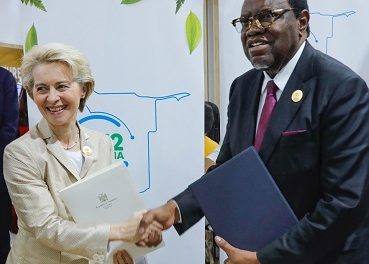
Cop 19 mechanism for loss and damage

Head of the Namibian delegation to the COP 19 conference, Dr Moses Amweelo.
The mechanism was established under the Cancun Adaptation Framework, subject to review at the twenty-second session of the Conference of the Parties from November to December 2016. It is formed to address loss and damage associated with the impact of climate change, including extreme events and slow onset events, in developing countries that are particularly vulnerable to the adverse effects of climate change.
According to Hon. Dr. Moses Amweelo, the Nambian head of delegation of the Parliamentary Standing Committee on Economics, Natural Resources and Public Administration at COP19, the mechanism is a great initiative as it will enable many Namibians to be compensated for damage to property caused by natural disasters such as floods.
Amweelo made reference to the 2006 floods in Mariental that caused damage to properties of the Mariental community. “Because such a mechanism was not in place, many people could not demand compensation for damaged goods but with such a mechanism in place, people will now be compensated for damage caused by floods,” he said.
Addressing the media on the outcomes of COP19, Amweelo also highlighted other achievements of the conference. He said a milestone was passed in Warsaw after 48 of the poorest countries of the world finalised a comprehensive set of plans to deal with the inevitable impacts of climate change.” With these plans, the countries can better assess the immediate impacts of climate change and what they need in a way of support to become more resilient,” Amweelo said.
In addition, governments provided more clarity on mobilizing finance to support developing countries’ actions to curb emissions and adapt to climate change. This, acording to Amweelo, includes requesting developed countries to prepare biennial submissions on their updated strategies and approaches for scaling up finance between 2014 and 2020.
“Developing countries including Austria, Belgium, Finland, France, Germany, Norway, Sweden and Switzerland have also paid or pledged over US$100 million to add to the Adaptation Fund, which has now started to fund national projects,” he said.
Resolutions were also set to help developing countries reduce greenhouse gas emissions from deforestation and the degradation of forests, which account for around one fifth of all human-generated emissions.
Amweelo called on Namibians to start implementing climate adaptation projects in order to access the 20% of the funds from the Adaptation Fund. “We should implement the notion of not cutting down trees, at an early stage especially at school and raise the awareness of planting more trees by educating them on climate change issues. Also, Namibians should start using solar or biomass energy especially in rural areas as opposed to using electricity,” Amweelo noted.
“Sustainable development and poverty eradication remain the priorities for the country.We must put aside our sense of greediness of power and wealth and tackle these major environmental threats that underpin the achievement of sustainable development,” Amweelo emphasised.












































